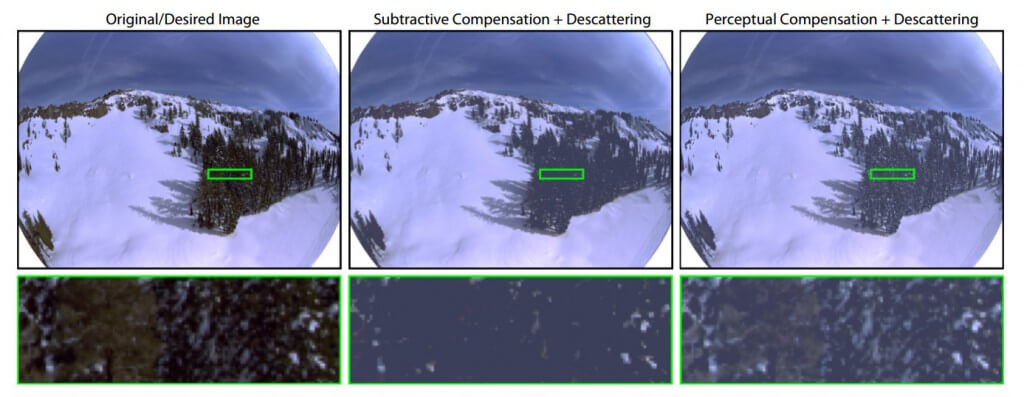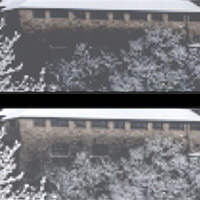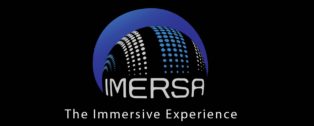Research into Fulldome Cross-Bounce
In the fulldome community we have some jargon for when digital projection bounces off the dome and then lights up other parts of the dome. We call this cross-bounce. It is always frustrating when the dome washes out from a bright scene and details are blown out.
But over at Disney Research Zürich, they have been working on a solution for a variety of screens: stereoscopic 3D dual projections, IMAX screens, and fulldomes. The title of their paper is Perceptually-Based Compensation of Light Pollution in Display Systems.
So in short, when projecting onto a concave screen the image is degraded due to indirect scattering. Descattering tries to remove this pollution by projecting a compensated image which cancels out the pollution.
Below is a video showcasing their work. I've tried to find some sort of software release of this as a plugin or stand-alone, but it seems this is still limited to academia for the time being. I'll be keeping my eyes out for this...
http://www.youtube.com/watch?v=4Ax6EdX7qLk#at=90
 When projecting onto a spherical dome, the projected image (left) is corrupted by indirect scattering. Subtractive methods (middle) can only correctly compensate the projected image in image regions with enough signal and negative values are clamped to black, leading to loss of detail in the observed image. Our perceptual compensation (right) retains more of these dark details while maintaining a final observed image that is perceptually closer to the unpolluted original image.
"This paper addresses the problem of unintended light contributions due to physical properties of display systems. An example of such unintended contribution is crosstalk in stereoscopic 3D display systems, often referred to as ghosting. Ghosting results in a reduction of visual quality, and may lead to an uncomfortable viewing experience. The latter is due to conflicting (depth) edge cues, which can hinder the human visual system (HVS) proper fusion of stereo images (stereopsis). We propose an automatic, perceptually-based computational compensation framework, which formulates pollution elimination as a minimization problem. Our method aims to distribute the error introduced by the pollution in a perceptually optimal manner. As a consequence ghost edges are smoothed locally, resulting in a more comfortable stereo viewing experience. We show how to make the computation tractable by exploiting the structure of the resulting problem, and also propose a perceptually-based pollution prediction. We show that our general framework is applicable to other light pollution problems, such as descattering."
When projecting onto a spherical dome, the projected image (left) is corrupted by indirect scattering. Subtractive methods (middle) can only correctly compensate the projected image in image regions with enough signal and negative values are clamped to black, leading to loss of detail in the observed image. Our perceptual compensation (right) retains more of these dark details while maintaining a final observed image that is perceptually closer to the unpolluted original image.
"This paper addresses the problem of unintended light contributions due to physical properties of display systems. An example of such unintended contribution is crosstalk in stereoscopic 3D display systems, often referred to as ghosting. Ghosting results in a reduction of visual quality, and may lead to an uncomfortable viewing experience. The latter is due to conflicting (depth) edge cues, which can hinder the human visual system (HVS) proper fusion of stereo images (stereopsis). We propose an automatic, perceptually-based computational compensation framework, which formulates pollution elimination as a minimization problem. Our method aims to distribute the error introduced by the pollution in a perceptually optimal manner. As a consequence ghost edges are smoothed locally, resulting in a more comfortable stereo viewing experience. We show how to make the computation tractable by exploiting the structure of the resulting problem, and also propose a perceptually-based pollution prediction. We show that our general framework is applicable to other light pollution problems, such as descattering."
 When projecting onto a spherical dome, the projected image (left) is corrupted by indirect scattering. Subtractive methods (middle) can only correctly compensate the projected image in image regions with enough signal and negative values are clamped to black, leading to loss of detail in the observed image. Our perceptual compensation (right) retains more of these dark details while maintaining a final observed image that is perceptually closer to the unpolluted original image.
"This paper addresses the problem of unintended light contributions due to physical properties of display systems. An example of such unintended contribution is crosstalk in stereoscopic 3D display systems, often referred to as ghosting. Ghosting results in a reduction of visual quality, and may lead to an uncomfortable viewing experience. The latter is due to conflicting (depth) edge cues, which can hinder the human visual system (HVS) proper fusion of stereo images (stereopsis). We propose an automatic, perceptually-based computational compensation framework, which formulates pollution elimination as a minimization problem. Our method aims to distribute the error introduced by the pollution in a perceptually optimal manner. As a consequence ghost edges are smoothed locally, resulting in a more comfortable stereo viewing experience. We show how to make the computation tractable by exploiting the structure of the resulting problem, and also propose a perceptually-based pollution prediction. We show that our general framework is applicable to other light pollution problems, such as descattering."
When projecting onto a spherical dome, the projected image (left) is corrupted by indirect scattering. Subtractive methods (middle) can only correctly compensate the projected image in image regions with enough signal and negative values are clamped to black, leading to loss of detail in the observed image. Our perceptual compensation (right) retains more of these dark details while maintaining a final observed image that is perceptually closer to the unpolluted original image.
"This paper addresses the problem of unintended light contributions due to physical properties of display systems. An example of such unintended contribution is crosstalk in stereoscopic 3D display systems, often referred to as ghosting. Ghosting results in a reduction of visual quality, and may lead to an uncomfortable viewing experience. The latter is due to conflicting (depth) edge cues, which can hinder the human visual system (HVS) proper fusion of stereo images (stereopsis). We propose an automatic, perceptually-based computational compensation framework, which formulates pollution elimination as a minimization problem. Our method aims to distribute the error introduced by the pollution in a perceptually optimal manner. As a consequence ghost edges are smoothed locally, resulting in a more comfortable stereo viewing experience. We show how to make the computation tractable by exploiting the structure of the resulting problem, and also propose a perceptually-based pollution prediction. We show that our general framework is applicable to other light pollution problems, such as descattering."Have you liked this post? Subscribe to FDDB Newsletter
Start the experience!
Not yet registered?
Sign up now, it's free!
Sign up now, it's free!





